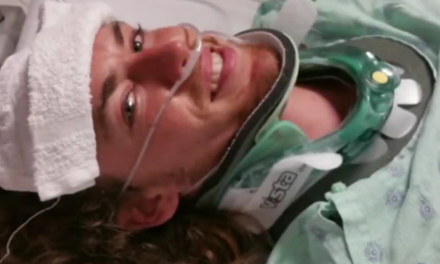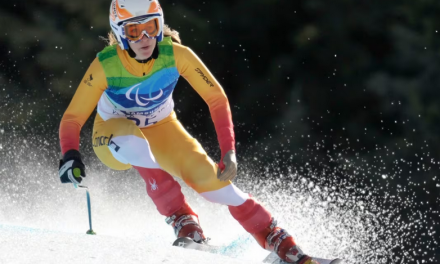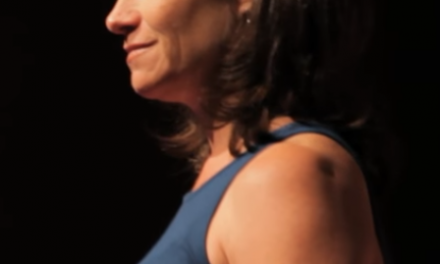Tyler Turner likes to live on a razor’s edge, and four-and-a-half years ago, a mysterious accident cost him his legs.
Thus began an arduous journey to a pair of Paralympic medals, but it was one that started with chronic pain, depression, and drug addiction. The daredevil was in hell.
It was on September 4, 2017 when Turner jumped from a plane thousands of feet from the ground – a typical day for the skydiving instructor. Turner inexplicably lost consciousness mid-air shortly after jumping from the plane, shattering both his legs upon impact.
In an unreleased short-form documentary titled Sixty Seconds, detailing Turner’s accident and rehabilitation, he laments lacking memory of the incident and remains without a convincing theory on what went wrong.
His right leg was almost immediately amputated from below the knee, and the left over a year later.
“I didn’t want to live my life as an amputee,” said Turner, on a Wednesday video call. “At the very start, my motivation was pretty much zero.”
The drugs managing his physical pain proved emotionally damaging. Even as his body improved, the mind continued to go wayward. His addiction to adrenaline was replaced with one arguably more dangerous.
“These drugs, they sink their talons into you,” said Turner of his prescribed painkillers. “They do a really good job of numbing the pain. They don’t numb emotions, though.”
To mask his despair, he felt an obligation to put on a brave face in front of his loved ones – a task more draining than a full day of mountain climbing for Turner. He hated being a burden to others.
Six months after the incident, the Campbell River, B.C., resident was still unable to walk and was stuck with his wheelchair. Ironically, he started to find his footing in rehab once his second leg was amputated.
“It allowed me to reinvent myself and find my identity again,” said the Paralympian. “After having my second leg amputated, I knew there was no doubt I’d be able to get back to doing the sports that I love to do and find the identity that I used to have.”
When advising other athletes who were traumatically injured in adulthood, the Canadian gold medallist recommends incremental goal setting combined with patience.
“You have to put your head down and do what you can do that day,” said Turner. “Just perpetual forward motion. If all you can do that day is roll over then hit that goal. Apathy is a killer.”
Turner made his Paralympic debut earlier this month in Beijing, winning gold in snowboard cross and bronze in banked slalom.
He hesitates to assume that future Paralympians can relate to his story, but he hopes it can spark conversations around the monumental struggles that amputees face and encourage them.
“It doesn’t happen overnight. It’s going to be a ruthless battle to get there. Just keep moving forward.”
About Tyler
A veteran of hundreds of jumps, Turner’s far removed from the terror that grips most people at the thought of leaping into thin air from 10,000 feet.
Then again, maybe he’s not completely immune to fear. Turner lost both legs below the knee because of a skydiving accident four years ago, a freak crash during an otherwise routine landing. He spent four days in a coma and years on painkillers, battling depression and addiction while he confronted the loss of his identity as a skydiver, snowboarder, rock climber, surfer and all-around adventure sports athlete. That’s what makes Turner’s return to aerial action all the more remarkable. He’s not only back to where he was before the accident, making multiple jumps a day as a skydiving instructor. Turner has actually gone above and beyond his previous heights, winning a Paralympic gold medal and becoming the first bilateral amputee to pilot a wingsuit. Tyler brings the same energy he has on the mountain and in the air when he engages with audiences. From the moment he steps in front of them, he leaves people with the empowering tools and focused mindsets that they will use long after the lights have gone out from the event.
Documentary – Sixty Seconds
In a moment in time, Tyler’s reality changed forever. This film documents the journey he takes with his body, mind and his perception of self. Drug dependency, depression, chronic pain, sleep deprivation, the pitfalls of life through social media, and his connection to sports that were such a defining force in his life are themes that are explored. Tyler’s life is cleaved into two segments: life prior to and after 60 seconds that he’ll never get back.
The film follows Tyler through the inevitable ebb and flow of his emotional, mental and physical wellbeing – and the ongoing balancing act between achieving personal independence and getting the support he needs from a huge professional and personal support network.
Anyone who comes into contact with Tyler gets an almost tangible sense of his innate strength of character and passion for life. And a sense of appreciation for a man who continues to find what is needed to move forward each day in an uncertain journey to recovery
“Which I’m OK with,” he said. “I have no PTSD. I’m quite lucky in a way,” he said.
But the months that followed were tough. He was in a coma for five days, and suffered a brain injury. His pelvis and spine were surgically fixated. He initially lost his right leg, but had his badly damaged left leg amputated about a year after the crash.
Depression, he said, was a “deep dark hole.” But the longing to snowboard, surf – and even skydive again – tugged at him. Plus, he wanted to prove people wrong.
Turner chronicled his progression in an Instagram story, beginning on Day 1 after his second amputation when, while still hooked up to an I.V., he popped a wheelie in the hospital hallway.
On Day 510, he was able to snowboard 10 feet, using poles for support. The pain, he said, was intense.
On Day 642, after being helped up onto his board by a friend, he rode a full run at K3 Cat Ski in Revelstoke, B.C., where he’d worked for years.
“I got back as early as humanly possible, because I love snowboarding, it’s my entire life,” Turner said. “And so, I pushed it pretty early. It was extremely painful, but also really rewarding to realize early on that I was still going to be capable of doing it. And then with a little bit of patience, I was able to work through getting the proper legs, proper prosthetics and have the right amount of healing time where, a couple of seasons after, I was able to really get back on the level I wanted to.”
In 2020, Turner became the first bilateral amputee to fly a wingsuit, calling the high-adrenalin pursuit the closest thing to being a bird.
His crash and his recovery, not only of his body, but of his love for life, was captured in long-time friend Lara Shea’s documentary “Sixty Seconds,” which premiered in November.
Turner cringes at the word “inspiration.”
“The ‘I word’ we call it in our house,” he said.
But he hopes his journey to the top of the Paralympic podium can help others see the possibilities.
“That is one of the coolest parts is that, as much as I don’t like the word inspiration, the ability to inspire people who are in a place that I was four years ago, which is a really dark place, I’m super aware of how that feels. And I had people that went out of their way, from athletes from the Canadian team, who helped to inspire me early on to pursue what I’m doing now.
“I think the word is overused, but if I can help to inspire people that are in that position, then that is the right way to use that word.”




